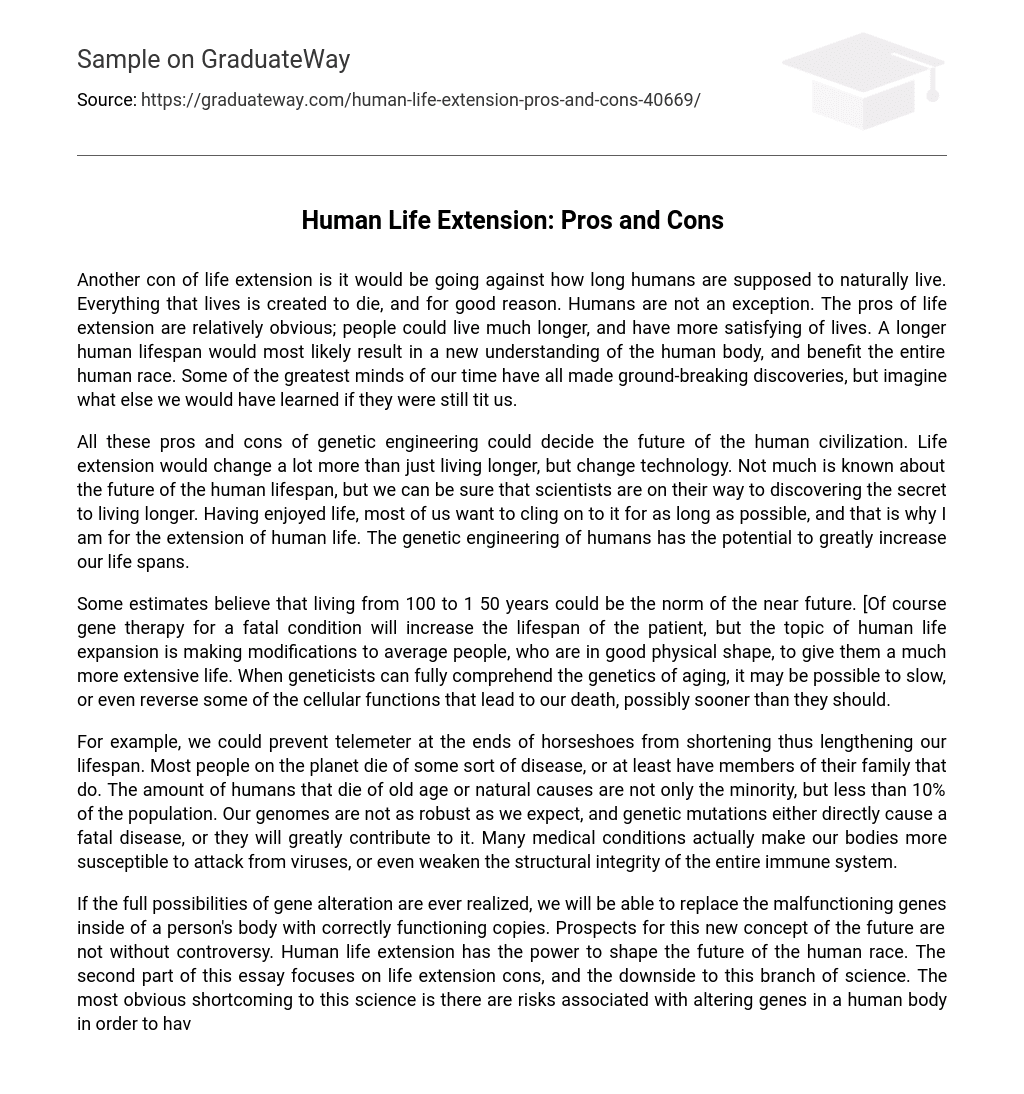Another con of life extension is it would be going against how long humans are supposed to naturally live. Everything that lives is created to die, and for good reason. Humans are not an exception. The pros of life extension are relatively obvious; people could live much longer, and have more satisfying of lives. A longer human lifespan would most likely result in a new understanding of the human body, and benefit the entire human race. Some of the greatest minds of our time have all made ground-breaking discoveries, but imagine what else we would have learned if they were still tit us.
All these pros and cons of genetic engineering could decide the future of the human civilization. Life extension would change a lot more than just living longer, but change technology. Not much is known about the future of the human lifespan, but we can be sure that scientists are on their way to discovering the secret to living longer. Having enjoyed life, most of us want to cling on to it for as long as possible, and that is why I am for the extension of human life. The genetic engineering of humans has the potential to greatly increase our life spans.
Some estimates believe that living from 100 to 1 50 years could be the norm of the near future. [Of course gene therapy for a fatal condition will increase the lifespan of the patient, but the topic of human life expansion is making modifications to average people, who are in good physical shape, to give them a much more extensive life. When geneticists can fully comprehend the genetics of aging, it may be possible to slow, or even reverse some of the cellular functions that lead to our death, possibly sooner than they should.
For example, we could prevent telemeter at the ends of horseshoes from shortening thus lengthening our lifespan. Most people on the planet die of some sort of disease, or at least have members of their family that do. The amount of humans that die of old age or natural causes are not only the minority, but less than 10% of the population. Our genomes are not as robust as we expect, and genetic mutations either directly cause a fatal disease, or they will greatly contribute to it. Many medical conditions actually make our bodies more susceptible to attack from viruses, or even weaken the structural integrity of the entire immune system.
If the full possibilities of gene alteration are ever realized, we will be able to replace the malfunctioning genes inside of a person’s body with correctly functioning copies. Prospects for this new concept of the future are not without controversy. Human life extension has the power to shape the future of the human race. The second part of this essay focuses on life extension cons, and the downside to this branch of science. The most obvious shortcoming to this science is there are risks associated with altering genes in a human body in order to have them carry out a desired function.
We simply do not know the potential long term complications of altering genes. For example, if you were to stop telemeter from shortening, would this have negative effects elsewhere in the genome? The human body is a maze of complex biological signals, pathways, and relationships, which play off of one another in order to create a stable body. A positive change now could cause a negative effect later. In addition, some argue that humans living longer will cause overpopulation problems, such as expanding poverty and damaging the environment.
However, they fail to realize that technology, urged on by the needs of the world, will provide solutions through improved agriculture, easier access to food, and better use of space resources. Some assume that people will continue to ex. bit signs of aging and be decrepit into their hundreds, and we would have many people who are kept alive for years in terrible health, sometimes beyond the point at which they wish to live. Merely extending life without improving health is a bad idea. This is why today’s medical world focuses, not just on preventing death, but on alleviating the effects of aging by curing diseases.
Discoveries will soon develop for the reversal of aging, so that elderly people might one day choose to revert to the mind and body of a healthy 20 year old. Most arguments against extreme life extension are based on the idea that it can never happen, or that it shouldn’t happen. As science and technology advances, these arguments are waning. Society will decide how it uses this technology, and it is for the government to weigh out the pros and cons of life extension in humans to see what may be aired out, and what should be illegal.





